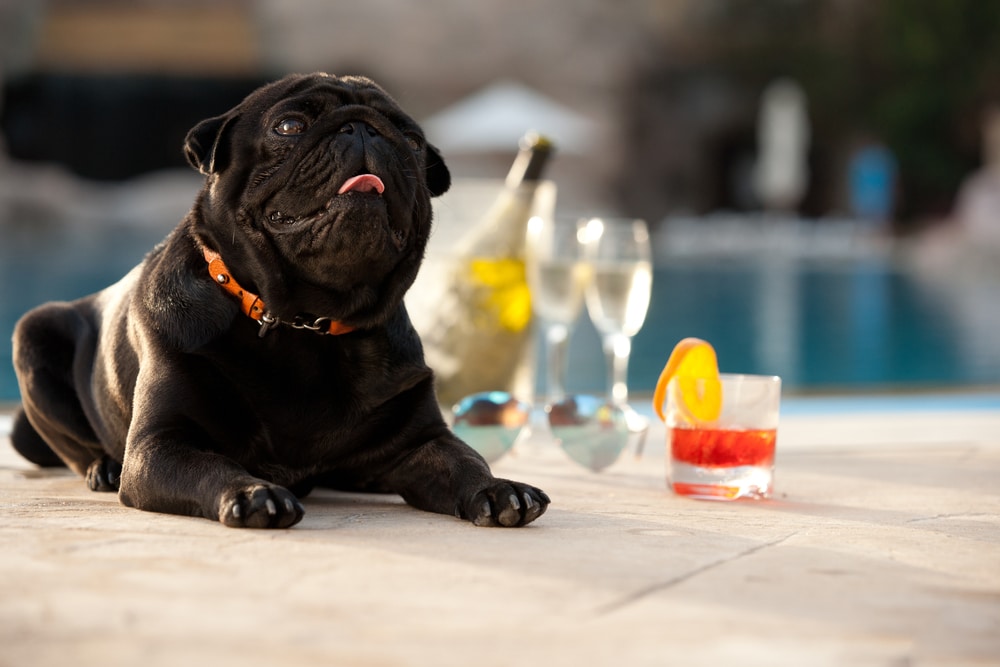The natural fermentation of sugars produces alcohol, which may attract dogs due to its sweet flavor and aroma. While no owner should leave alcohol unattended around dogs, it’s natural to wonder how different sizes of dogs react to ingesting alcohol. This article will focus on small dogs, so, how much alcohol can a small dog have?
Alcohol is toxic to small dogs, and even very small amounts can result in poisoning. Small dogs’ livers are unable to process alcohol’s chemical constituents like ethanol. So, even a little amount of alcohol may result in organ failure in small dogs, which will undoubtedly result in death.
Table of Contents
- Why Is Alcohol Bad For Small Dogs?
- Alcohol Poisoning In Small Dogs
- Why Do Small Dogs Like Alcohol?
- How To Prevent A Small Dog From Drinking Alcohol?
- What To Do If A Small Dog Consumes Alcohol?
- How To Treat Alcohol Poisoning In Small Dogs?
- Related Questions: How Much Alcohol Can A Small Dog Have?
- Conclusion: How Much Alcohol Can A Small Dog Have?
Why Is Alcohol Bad For Small Dogs?

Alcohol can induce life-threatening conditions in small dogs even when consumed in little amounts. Alcohol increases the acidity levels in small dogs which causes respiratory distress, depression, slow heartbeat, and low blood pressure. Sudden drops in blood pressure and heart rate might result in a heart attack death in small dogs.
Small dogs’ stomach linings are similarly affected by high amounts of acidity, which can cause upset digestion, ulcers, vomiting, and diarrhea. In addition, alcohol affects small dogs’ neurological systems and reduces their blood sugar levels. It also causes weakness, lethargy, seizures, and impaired coordination.
Alcohol Poisoning In Small Dogs
When a small dog ingests alcohol or alcohol-containing products like sanitizers and flea sprays, alcohol poisoning occurs. Ethanol is poisonous to dogs, which is present in alcohol. Alcohol typically enters the bloodstream through the digestive system. The dog’s neurological system and respiratory system, two of its most vital systems, are affected once it reaches the bloodstream. The dog consequently presents as lethargic, weak, refuses to eat, and is unable to walk due to poor coordination.
Signs Of Alcohol Poisoning
The most significant and typical symptoms small dogs exhibit after drinking alcohol include vomiting, depression, incoordination, seizures, respiratory failure, and organ failure. We’ll start with vomiting.
Vomiting
Alcohol irritates the mucosal lining (the lining of organs such as stomachs) of small dogs. Alcohol is naturally acidic, and a sudden rise in acidity irritates the stomach’s inner mucosa. In order to get rid of this irritating liquid from its stomach, the dog begins to vomit.
Depression
Even small dogs that consume a few licks of alcohol experience depression. Alcohol affects the neurological system, whether it is made of ethanol, methanol, or isopropanol. Alcohol disrupts the nerves’ normal functioning, which causes depression.
Incoordination
Alcohol reduces brain activity by producing more neurotransmitters in the brain. It increases neurotransmitters and slows down neuron-to-neuron communication even when ingested in small doses. Incoordination, therefore, results from a lack of communication between the brain and other body systems.
Seizures
Small dogs who consume alcohol become uncoordinated and lose control of their organs as a result. The dog starts shaking and loses balance while standing or walking as a result of inadequate brain-body coordination. The prolonged release of neurotransmitters and inadequate brain connectivity can cause seizures.
Respiratory Failure
Alcohol depresses the respiratory system by causing a sudden rise in acidity levels. Small dogs’ glottic reflexes (necessary body functions for breathing) are similarly impaired by alcohol. Therefore, respiratory failure may arise as a result of oversedation and poor brain-respiratory coordination.
Organ Failure
Dogs’ ability to control bodily fluids and electrolytes is affected by alcohol. As a result, the kidneys are unable to effectively filter the blood. Alcohol dehydrates the dog, which affects the way cells and tissues function and leads to organ failure.
Why Do Small Dogs Like Alcohol?
Small dogs are attracted to fruit-based beverages, ciders, and other drinks that contain alcohol. They are drawn to drinks due to the liquids’ sweet flavor.
How To Prevent A Small Dog From Drinking Alcohol?
The best approach to stop a dog from drinking alcohol is to keep the alcohol out of the dog’s reach. Here are a few other ways to stop dogs from drinking alcohol too.
Do Not Drink Alcohol In Front Of The Small Dog
Small dogs often mimic their owners’ behaviors. They will attempt to lick and consume alcohol from a glass if you drink in front of them. Therefore, it is advised against drinking in front of tiny dogs because they pick things up quickly.
Do Not Leave Alcohol Unattended
Once you’ve finished your alcoholic beverage, you must clean the glass. Otherwise, the dog can lick the glass and become intoxicated by alcohol.
Monitor Your Small Dog
It is normal to share drinks with guests who are staying with you. You shouldn’t ignore your small dog, though. Keep an eye on the dog because it might consume the alcohol from the glass or lick the bottle. Be sure to tell your guests not to leave their glasses unattended or to give any alcohol to your dog too.
Keep Your Small Dog In Another Room
Keep your small dog in a different room when you are having drinks with guests or friends. Avoid drinking in front of dogs since they can try to lick the glass owing to the alcohol’s taste in their sweat.
What To Do If A Small Dog Consumes Alcohol?
For little dogs, even very modest amounts of alcohol are harmful. Consult a veterinarian if your small dog has a few licks of alcohol. Smaller dogs frequently display signs of alcohol poisoning due to their high metabolic rates. Visit a veterinarian right away if the dog displays symptoms like vomiting, lethargy, shaking, depression, or lack of coordination.
If your regular vet isn’t available, try an emergency vet. Many vets will list emergency vets on their website. You can also contact Animal Poison Control too.
How To Treat Alcohol Poisoning In Small Dogs?
A veterinarian must be consulted in order to treat alcohol toxicity. Through supportive treatment, the veterinarian assists the dog in maintaining a healthy blood sugar level, heart rate, blood pressure, and body temperature. In order to prevent severe intoxication, the veterinarian may induce vomiting in dogs who have recently consumed alcohol.
Related Questions: How Much Alcohol Can A Small Dog Have?
For small dogs, 5.5g/kg of 100% ethanol is lethal. Small dogs may get poisoned by alcohol at doses below this.
Is Alcohol Lethal To Small Dogs?
Yes, alcohol is lethal to small dogs. Lower doses of alcohol can also result in alcohol poisoning, and 5.5g/kg is the lethal dose.
Is Alcohol A Good Choice To Relax A Small Dog?
No, alcohol can drastically impair a dog’s nervous system, causing tremors, seizures, and impaired coordination. In addition, it can lead to respiratory failure from oversedation.
Can I Prevent Alcohol Poisoning In My Small Dog?
Yes, you can avoid alcohol poisoning by preventing your small dog from drinking alcohol. If the dog has consumed alcohol, consult a veterinarian right away. The vet will take the appropriate measures to help your dog.
What Does Alcohol Contain?
The alcohol we drink contains ethanol which is toxic to dogs.
Conclusion: How Much Alcohol Can A Small Dog Have?
Alcohol is toxic and lethal to small dogs. In addition to lowering blood pressure, sugar levels, and heart rate, it can also lead to respiratory distress, depression, and lethargy. Alcohol consumption can cause the stomach’s acidity levels to rise, which can cause vomiting and indigestion. Alcohol’s acidic nature also affects the stomach mucosa and leads to ulcers. Therefore, if your small dog drinks alcohol, you should consult a veterinarian right away.
With all that said, we’d like to know what’s got you curious about this issue. Let us know your thoughts and why in the comments below!
